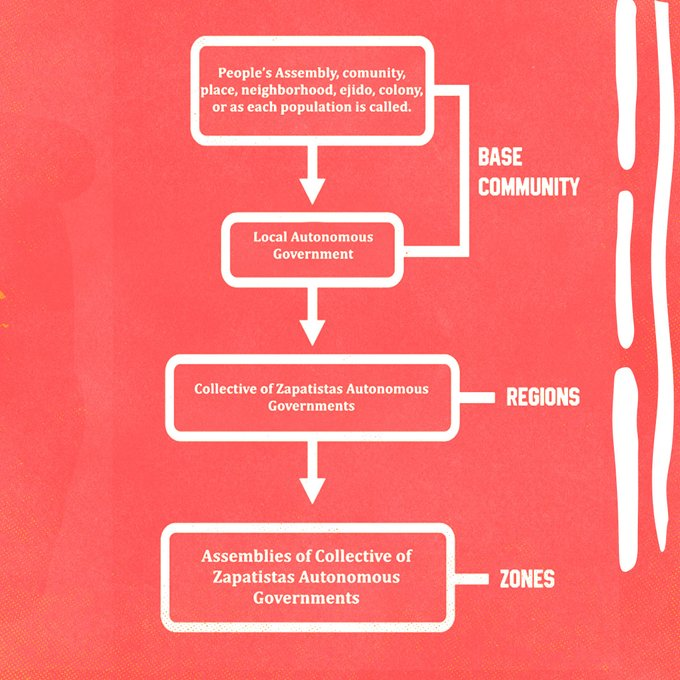link https://www.somoselmedio.com/ezln-da-a-conocer-su-nueva-estructura-en-comunicado/
After announcing the disappearance of the Good Government Councils (JBG) and the Zapatista Rebel Autonomous Municipalities (MAREZ), this Sunday, November 12, the EZLN announced the structural reorganization of the Zapatista Autonomy.
By Johana Utrera / @UtreraJo25
On November 12, the ninth part of a series of communiqués was released through the Enlace Zapatista. This document signed by Subcomandante Insurgente Moisés explains the new structure of the Zapatista Autonomy.
In this new structure the Local Autonomous Government (LAG) is the main base; which is coordinated by autonomous agents and commissioners, who are subject to the assembly of the town, ranchería, community, paraje, barrio, ejido, colonia or as the communiqué explains, “or as each population names itself”. In the same way, the GALs are in charge of controlling their autonomous organizational resources and their relationship with non-Zapatista communities.
“And it controls the good use of the pay. It also detects and denounces bad administration, corruption and errors. And it is aware of those who want to pass themselves off as Zapatista authorities to ask for support or aid that they use for their own benefit”.
On the other hand, mention is made of the Collectives of Zapatista Autonomous Governments (CGAZ), which are convened by the GALs. The CGAZ discuss and make agreements corresponding to the interests of the GAL. In this sense, the CGAZ leaders ensure the fulfillment of the requests of the GALs or any other community need.
“Here they propose, discuss and approve or reject the plans and needs of Health, Education, Agroecology, Justice, Commerce, and those that are needed”.
Subsequently, there are the Assemblies of Collectives of Zapatista Autonomous Governments (ACGAZ), these are dependent on the CGAZ and in turn, the CGAZ are dependent on the GAL. The ACGAZ are based in the caracoles, however, they move according to the needs of the villages. In addition, their function is to convene and preside over zone assemblies, when necessary, according to the requests of the GAL and CGAZ.

“As will be seen in practice, the Command and Coordination of Autonomy has been transferred from the JBG and MAREZ to the peoples and communities, to the GAL. The zones (ACGAZ) and the regions (CGAZ) are commanded by the peoples, they must be accountable to the peoples and seek ways to meet their needs in Health, Education, Justice, Food and those arising from emergencies caused by natural disasters, pandemics, crimes, invasions, wars, and other misfortunes that the capitalist system may bring”.
Finally, the communiqué explains that this reorganization of the structure has the objective of increasing the security defense of the villages and the land. Similarly, it explains that this process has been in the making for 10 years and 3 to think about it in a practical way.
“In reality, this communiqué has only the intention of telling you that the Zapatista autonomy continues and advances, that we think that it will be better for the towns, communities, places, neighborhoods, colonies, ejidos and ranches where the Zapatista support bases live, that is to say, fight. And that it has been their decision, taking into account their ideas and proposals, their criticisms and self-criticisms.”
It is worth mentioning that this new structure was mentioned last November 5 of this year. When the fourth part of the communiqués communicated the disappearance of the Good Government Councils (JBG) and the Zapatista Rebel Autonomous Municipalities (MAREZ), as well as the provisional closure of the Caracoles.


It’s not dissimilar from Cuba, Venezuela, China, USSR, or any other socialist project really. This rejuvenation is more of a throwing out of the entrenched bureaucracy that had formed out seems.
Something that could do good in most socialist projects.
Throwing out entrenched bureaucracies is good. IMO not being able to do so was one reason the USSR collapsed.